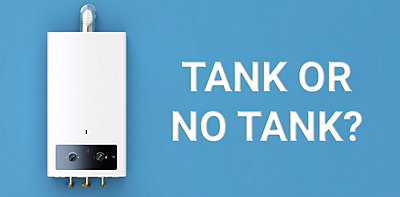Different Types of Water Heaters | Tank & Tankless

June 29, 2021
With energy-efficiency and comfort as top priorities for today’s homeowners, the water heater is becoming more and more important. Since water heating accounts for around 20% of your total energy bill, you may be looking into tankless water heaters as the solution. But what are tankless heaters, and how do they differ from their traditional tank counterparts?
Tank heaters are the standard method for heating water, as they do their job well and have a much lower upfront installation cost. However, they have half the expected lifespan of a tankless heater and consume much more energy to run (mostly due to standby heat loss).
Although a conventional storage tank water heater is still an important and well-performing piece of equipment, it is good to know what else is out there on the market — especially if you’re looking to renovate or replace.
In looking at upfront costs, maintenance effort, performance, and lifespan, we’ve broken down the pros and cons of both tank and tankless water heater options.
Tank Water Heater
Also called a storage water heater, this type of water heater stores hot water – around 20-80 gallons – for use at any time. Water is constantly being heated in the tank. Cold water enters the tank from the bottom, where it is heated to replace the hot water that was previously used.
There are two main types of storage water heaters: gas/oil water heaters and electric water heaters (including heat pump units).
Lifespan: 8-12 years
Average installation cost: $500-$800 (national average)
Annual operation cost: Is your water heater electric or gas? For example, a 50-gallon, electric water heater with a .90 Energy Factor (the higher the EF, the more efficient the water heater) and an electricity rate of $.09 per kilowatt hour ($0.13 per kWh for electricity is the Federal average price in the U.S.) will cost over $500 to operate annually. Use this Energy Cost Calculator from Energy.gov to find the operating cost of your home’s specific make and model.
Energy Efficiency: Gas will use about 50% less energy than electricity.
Maintenance: Service and cleaning annually
A tank water heater is still a staple in most all American homes. With the traditional tank model, we have hot water at our disposal, heated continuously and ready for use. There is, however, a limit. You only get the amount of water that the tank is able to hold.
Pros:
- Cheaper to purchase
- Cheaper to install
Cons:
- Significant standby heat loss (you can reduce standby heat loss and annual operating costs by scheduling regular water heater maintenance and by wrapping your water heater in an insulation blanket)
- Not enough hot water (having to wait for hot water)
- Sediment buildup and annual maintenance
- Risk of water damage from leaking tank
Tankless Water Heater
Also known as demand-type or instantaneous water heaters, tankless water heaters heat water as it passes through the unit rather than heating water in a tank. As a result, tankless systems are a lot smaller and eliminate standby energy losses.
Lifespan: 20+ years
Average installation cost: $2,000-$4,000 (national average, varies based on model, may face additional costs due to retrofitting or rewiring)
Annual operation cost: The U.S. Department of Energy estimates that a typical family can save $100 or more in energy costs per year over their traditional tank counterparts.
Energy Efficiency: According to the U.S. DOE, “For homes that use 41 gallons or less of hot water daily, demand (or tankless) water heaters can be 24% to 34% more energy efficient than conventional storage tank water heaters.”
Maintenance: Annual maintenance is not required; maintenance is recommended based on “water-hardness.”
Tankless water heaters are also called Demand-Type water heaters because they heat on demand. Meaning that instead of using energy to heat water all the time, it will only heat water when you turn the hot water handle on the faucet. Cold water then makes its way through piping to meet a gas burner or electric element that heats the water and delivers it straight to you.
Tankless is a more hot water-by-request system. You may have to wait a few extra seconds to get your hot water than you would with a tank storage heater, but it uses less energy by design. By eliminating the extra cost of keeping 30-50 gallons of stored water hot and ready to go, the tankless, on-demand design will inevitably save you money on your utility bills.
Other savings will occur when considering the long lifespan of a tankless system. With double the lifespan, you won’t need to be saving for that large water heater replacement fee anytime soon. Tankless systems also require less maintenance. If you currently own your home and plan to stay put for decades to come, this is something to consider.
Pros:
- Up to 34% more energy efficient
- Limitless hot water (constant supply of hot water)
- No more problems with sediment buildup, tank noises, recovery times, leaking tanks, and temperature problems
- Much smaller in size
Cons:
- Limited flow rate of hot water (most tankless water heaters provide hot water at a rate of 2-5 gallons per minute), which means that multiple, simultaneous uses of hot water may push it to its limit
- Depending on various factors, the energy savings may not meet the higher upfront cost of purchase
Although monthly utility costs are lower and the lifespan is longer, the upfront installation costs are not something everyone can or wants to invest. However, tankless units save money over time in energy savings and maintenance costs, and their higher initial cost reflects this.
If you are thinking about replacing your existing unit, contact the water heater experts at Service Champions for a worry-free experience. Every water heater comes with a “No-Change-Order Guarantee” which ensures a single, upfront price. There is zero difference in the estimate you receive and the price you pay.
Service Champions is known for trustworthy, on-time HVAC and water heating service throughout the East Bay, South Bay, and Sacramento areas.
If you have any questions or concerns, contact us today.
